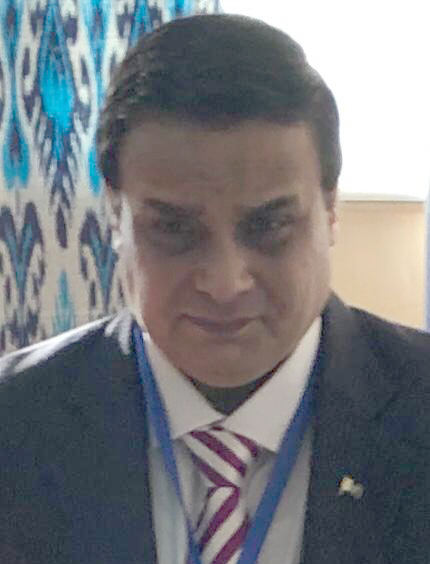Dr Mehmood Ul Hassan Khan
Executive Director: The Center for South Asia & International Studies (CSAIS) Islamabad
Regional Expert: China, CPEC & BRI
Taiwan has become a high voltage political drama of Bollywood with many twists. Chronic instigative conduct of the US has been trying to irritate China on the issue of Taiwan. Its constant and continued speculative connections with the authorities of Taiwan are creating serious problems of peace and stability in the region.
In this regard, Pelosi’s ill-conceived trip to Taiwan opened a gate of unwanted economic, military and political assistance from the US establishment which has rattled bilateral relations between the US and China because it genuinely considered Taiwan as its red line which should not be crossed and compromised at any cost.
Unfortunately, the US authorities have once again started geopolitical maneuverings on Taiwan by obliging transit visit of Lai Ching-teh the deputy leader of Taiwan to its country. Naturally it has started heated debate in the regional as well as international media because recent visits of the Secretary of State Antony Blinken, John Kerry, Kissinger and Janet Yellen to Beijing somehow enhanced the prospects of restoration of lines of communication between both the countries but shockingly even Blinken did not consider it provoking and emphasised that Lai’s trip should not impact the restoration of lines of communication between Washington and Beijing and described Lai’s travel as private and unofficial. Therefore he indirectly supports the proposed visit which is not good omen for both the countries.
For obvious reasons, China firmly opposed this visit and categorically upheld that any form of official exchanges between the US and Taiwan, as well as any actions that support Taiwan independence is not acceptable.
As an unwise political move, Lai a prominent political figure in Taiwan’s Democratic Progressive Party purposefully announced that he would be leaving Taiwan to attend the inauguration of the President of Brazil in Paraguay on August 12th. As part of his trip, Lai plans to make a transit stop in the US, with stops in New York and San Francisco.
It seems that it is a well planned trip which has multidimensional secret aims and agendas, starting from securing political support for his imminent participation in the so-called presidential election in island, securing diplomatic, economic, military and supposed moral support from the international community and last but not least, to pinch China. Sorry to say the Taiwanese leaders will achieve nothing but further political isolation and economic marginalization out of this political zero-sum gaming.
Additionally, the response of China’s Ministry of Foreign Affairs spokesperson was timely and comprehensive covering all aspects of historical, political, diplomatic realities and social dimensions about Taiwan. For centuries Taiwan has been integral part of mainland China, attaining utmost importance and a red line in Sino-U.S. relations.
Rightly, China strongly demanded US to abide-by to the one-China principle and the provisions of the three Sino-U.S. joint communiqués. Moreover, they have been urging the US to honor its commitment of not supporting Taiwan’s independence and ceasing all official exchanges with Taiwan as it is a sign of political maturity and diplomatic wisdom.
Furthermore, China rightly demanded that the US should put an end to any actions that could potentially upgrade substantive US-Taiwan relations and prevent any support or encouragement of Taiwan independence forces be it through words or through military aid.
Undoubtedly, the message was loud and clear that arranging for Lai’s transit visit to US would be seen as a wrong signal and measures would be taken to safeguard China’s sovereignty and territorial integrity. Moreover, the US government should stay away from any connivance and support for so-called Taiwan independence separatists and their separatist activities.
It deems that the Chinese policy makers will closely follow the developments and take firm and strong measures to safeguard its nation’s sovereignty and territorial integrity because supposed Taiwanese independence is a dead end. The US increasing political honey-moon with Taiwan’s government is its deliberate move which will only harm the people of Taiwan.
The statement of Alexander Yui Tah-ray, Taiwan’s foreign vice-minister about the visit of Lai, who will represent the ruling Democratic Progressive Party in the island’s presidential election next year, will lead a delegation of about 50 Taiwanese business leaders and government officials for the week-long trip, is self-explanatory showing multiplier dividends.
In summary, the proposed visit of Lai’s transit visit to US is untimely and inappropriate that would lead towards unfortunate consequences. The US Secretary of State Antony Blinken’s warning to Beijing against using Lai’s transit in the US as a pretext for provocative action is not up to mark and it vividly reflects new evil motives of the US government towards China.
It would antagonize Beijing. Therefore the Joe Biden administration should avoid it because it creates more troubles in the US-China bilateral relations and further strains it. China is rightly criticizing an upcoming stopover in the United States by Taiwan’s vice president and presidential front-runner William Lai as a challenge to its territorial integrity, while Taiwan says it’s merely a transit stop. In this regard, China had already lodged formal protests with the U.S. over Lai’s visit during this month.
Despite the US’s administration official stance terming such trips as usual does not lessen its political aftershocks. It has symbolism and semiotics. It has political color and geopolitical conspiracy which should not be fame of hall.
It will produce strains in the restoration of lines of communications between both the countries. The Taiwanese delegations usually hold meetings with US officials during these visits, angering Beijing.
Lai’s upcoming US trip is deliberate and especially symbolic because he has topped most polls as a favorite to win the January presidential election. China sees both Tsai and Lai as separatists and has refused to talk with them.

















